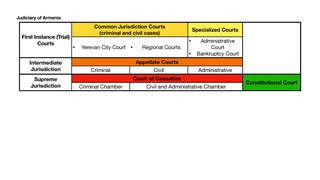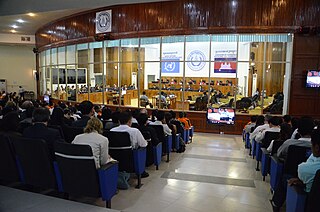Administrative law is a division of law governing the activities of executive branch agencies of government. Administrative law includes executive branch rule making, adjudication, and the enforcement of laws. Administrative law is considered a branch of public law.
The judiciary of Germany is the system of courts that interprets and applies the law in Germany.
The judiciary of Australia comprises judges who sit in federal courts and courts of the States and Territories of Australia. The High Court of Australia sits at the apex of the Australian court hierarchy as the ultimate court of appeal on matters of both federal and State law.

The judicial system of Turkey is defined by Articles 138 to 160 of the Constitution of Turkey.

The law of Brazil is based on statutes and, partly and more recently, a mechanism called súmulas vinculantes. It derives mainly from the European civil law systems, particularly the Portuguese, the Napoleonic French and the German.

The Constitutional Court of Korea is one of the highest courts—along with the Supreme Court—in South Korea's judiciary that exercises constitutional review, seated in Jongno, Seoul. The South Korean Constitution vests judicial power in courts composed of judges, which establishes the ordinary-court system, but also separates an independent constitutional court and grants it exclusive jurisdiction over matters of constitutionality. Specifically, Chapter VI Article 111(1) of the South Korean Constitution specifies the following cases to be exclusively reviewed by the Constitutional Court:
- The constitutionality of a law upon the request of the courts;
- Impeachment;
- Dissolution of a political party;
- Competence disputes between State agencies, between State agencies and local governments, and between local governments; and
- Constitutional complaints as prescribed by [the Constitutional Court] Act.

The Supreme Court of Korea is the highest ordinary court in the judicial branch of South Korea, seated in Seocho, Seoul. Established under Chapter 5 of the Constitution of South Korea, the Court has ultimate and comprehensive jurisdiction over all cases except those cases falling under the jurisdiction of the Constitutional Court of Korea. It consists of fourteen Justices, including the Chief Justice of the Supreme Court of Korea. The Supreme Court is at the top of the hierarchy of all ordinary courts in South Korea, and traditionally represented the conventional judiciary of South Korea. The Supreme Court has equivalent status as one of the two highest courts in South Korea. The other is the Constitutional Court of Korea.

The chief justice of the Supreme Court of Korea is the chief justice of the Supreme Court of Korea. As presiding judge of the grand bench composed of two-thirds of fourteen Supreme Court justices, the chief represents the Supreme Court of Korea. The chief justice is regarded as one of two equivalent heads of judicial branch in Government of South Korea. Another head is the president of the Constitutional Court of Korea. The current chief justice of the Supreme Court of Korea is vacant and Supreme Court Justice Ahn Chul-sang is acting as the chief justice of the Supreme Court of Korea.

In most legal jurisdictions, a supreme court, also known as a court of last resort, apex court, and highcourt of appeal, and court of final appeal, is the highest court within the hierarchy of courts. Broadly speaking, the decisions of a supreme court are binding on all other courts in a nation and are not subject to further review by any other court. Supreme courts typically function primarily as appellate courts, hearing appeals from decisions of lower trial courts, or from intermediate-level appellate courts. A supreme court can also, in certain circumstances, act as a court of original jurisdiction.

The judiciary of Portugal is a system of courts that together constitute one of the four organs of Sovereignty as defined by the Portuguese Constitution. The courts are independent from the other three Portuguese organs of Sovereignty.

Specialized court is a type of court with limited subject-matter jurisdiction concerning particular field of law, compared to 'ordinary court' with general subject-matter jurisdiction. This concept of court usually includes administrative court or family court.

The Supreme Court is the highest court in the Kingdom of Spain. The court has original jurisdiction over cases against high-ranking officials of the Kingdom and over cases regarding the legalization of political parties. It also has ultimate appellate jurisdiction over all cases. The Court has the power of judicial review, except for the judicial revision on constitutional matters, reserved to the Constitutional Court.

The judiciary of Malta interprets and applies the laws of Malta, to ensure equal justice under law, and to provide a mechanism for dispute resolution. The legal system of Malta is based partially on English law and partly on Continental law, whilst also being subject to European Union law.

The Judiciary of Brazil is the group of public entities designated by the Brazilian constitution to carry out the country's judicial functions.

The judiciary of Italy is composed of courts and public prosecutor offices responsible for the administration of justice in the Italian Republic. These offices are occupied by judges and prosecutors respectively, who are known as magistrates. Magistrates belong to the magistracy, that is to say a branch of the State that may only be accessed by Italian citizens, who must hold an Italian Juris Doctor and successfully partake in one of the relevant competitive public examinations organised by the Ministry of justice.

The law of Cyprus is a legal system which applies within the Republic of Cyprus. Although Cypriot law is extensively codified, it is still heavily based on English common law in the sense that the fundamental principle of precedent applies.

The Judiciary of Armenia interprets and applies the laws of Armenia. Under the doctrine of the separation of powers, judiciary exercises judicial power separately from the legislative power of Parliament and executive power of the Prime Minister. Per the Constitution, it is defined with a hierarchical structure regulated by the Supreme Judicial Council of Armenia. On the other hand, the Ministry of Justice of Armenia is a government agency which possesses executive authority and executes policies of the Government of Armenia in sectors that are closely associated with laws and regulations.

The judiciary of South Korea is the judicial branch (사법부) of South Korean central government, established by Chapter 5 and 6 of the Constitution of South Korea.
Rapporteur Judge or Rapporteur-Judge is a term for number of judicial officials similar to judicial assistant at highest court, usually functioning as rapporteur while having status equivalent to lower ordinary court judges.

An extraordinary court, or special court, is a type of court that is established outside of ordinary judiciary, composed of irregularly selected judges or applies irregular procedure for judgment. Since extraordinary court can be abused to infringe fundamental rights of individuals, contemporaly most of countries ban such courts by constitution or statutes. Usually, modern military courts judged by courts-martial are regarded as examples of extraordinary courts.















